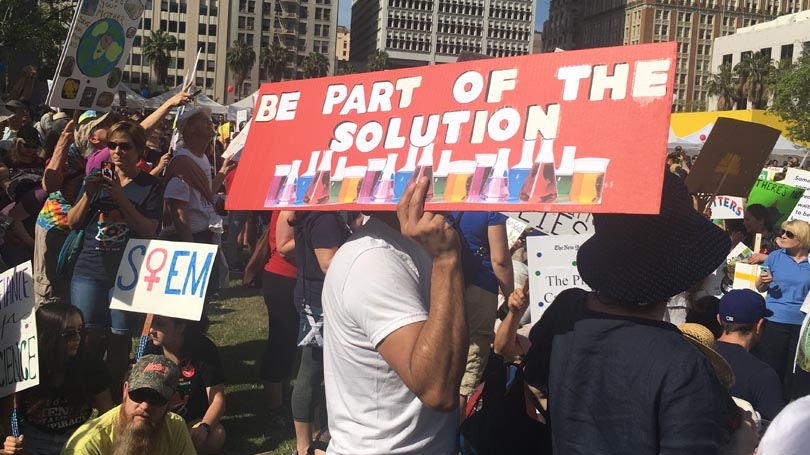
Anna Hatch, GR '17, is a Fellow at Research!America and attended the March in Los Angeles. (Photo by Anna Hatch)
Several members of the Dartmouth community marched and rallied at marches across America. More than just promotion of a "cargo cult science", they were marching for good governance and deeper understanding of just exactly what it is that makes for good science.
On Earth Day, Saturday, April 22, 2017, tens of thousands of people participated in rallies, walks, and marches held in Washington D.C. and in hundreds of other cities across the world. The March for Science saw an outpouring of support for science that was “unprecedented in terms of the scale and breadth of the scientific community involved,” according to Robert Proctor, a professor of the history of science at Stanford University.
According to the organizers, the event was a call for “political leaders and policymakers to enact evidence-based policies in the public interest,” but what propelled many onto the streets to march are the policy proposals and developing relationship the current administration has with scientists and their role, not only in the decision making process but also in positions of leadership in advisory bodies such as the Environmental Protection Agency.
Melody Brown Burkins, the Associate Director for Programs and Research in the John Sloan Dickey Center for International Understanding and an environmental studies professor at Dartmouth, spoke at the march in Concord, New Hampshire about how instrumental scientific research is in shaping effective policy in D.C. “I saw first-hand how access and attention to independent scientific data could both inform and shape responsible policy,” she said. “We’re standing up not only for science but good government.”
Also a speaker in Concord, earth sciences assistant professor Erich Osterberg said he marched “to get past this false debate about whether climate change is real so we can have the real debate about what we can do to fix it.”
“I reached a tipping point last fall,” says Osterberg, “when at the same time so many of our leaders were saying that climate change is a hoax and that climate scientists, like me, are falsifying our data, the earth was literally shattering it’s temperature record for the third year in a row. Those temperature jumps that we saw in 2015 and 2016 were twice as large as any we’d previously seen. This rhetoric was completely removed from the reality we know as climate scientists,” stated Osterberg in his speech.
Jane Hill, associate professor at the Thayer School of Engineering, one of the members of the community participating in the Dartmouth march, noted that the public’s trust in science has been eroding in recent years, referring to the surge in populist websites, self-proclaimed experts, and propaganda around science topics including the use of vaccinations and climate change. “Scientists are naturally skeptics, so having a public that queries what is in front of them is an excellent circumstance. However, without all of us having a strong foundation in scientific thinking and literacy, we might fall victim to persuasive “alternative facts” which can sound incredibly convincing and play to our own biases, fears, or hopes. With information available at our fingertips, separating fact from fiction is a major challenge of our time,” she says of the importance of science literacy.
A small group of students, staff, faculty and community members gathered on the Green in Hanover, despite the drizzle and cold, to show support for science and to walk to the Montshire Museum of Science, which was hosting an open doors event in celebration of science. Marcos Staphne, executive director of the Montshire, said, “Seeing the Dartmouth community march across the Ledyard Bridge to join the Montshire’s Day of Science was a incredible show of support for science research, education, and literacy.”
Nicholas Warren, the president of the Dartmouth Science, Technology and Engineering Policy Society and PhD candidate in the Program in Experimental and Molecular Medicine marched in Boston, where an estimated crowd of 70,000 showed up despite the cold and rain. “Science should not be a partisan issue,” Warren stated, “but is often questioned and undermined when it reveals politically inconvenient realities. In order to address the most important issues facing our society, we need a systematic approach to gather evidence to inform policies and create new technologies. Science is that approach.”